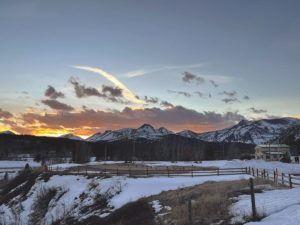“There’s very little legitimate literature about Native people,” says Fine Arts Work Center writing fellow Sterling HolyWhiteMountain, who grew up on the Blackfeet Reservation in Montana. “It wasn’t until I read Sherman Alexie’s first book of short stories when I was about 21 or 22 that I realized you could write about Indian country. When everything you read growing up represents something other than what you know, you begin to believe that you don’t exist.”

A graduate of the Iowa Writers’ Workshop and recipient of fellowships at the University of Wisconsin and Stanford University, HolyWhiteMountain writes fiction and nonfiction about the history and culture of the Blackfeet tribe. He is currently at work on his first novel, from which he will be reading excerpts at the Stanley Kunitz Room on Saturday, March 5 at 7 p.m. along with poet Tracy Fuad.
HolyWhiteMountain’s writing strives to capture specificity, not generalizations. “The second you try to write about the ‘Native experience’ instead of the Blackfeet, Crow, Apache, or Spokane, what you’re actually doing is recapitulating the American idea of the Indian in a way that is problematic and troubling,” he says. “Americans are the only ones who think that there is such a thing as a ‘Native experience.’ I experience myself and the people around me.”
While his nonfiction addresses political issues, HolyWhiteMountain’s fiction focuses more on emotions. “Art is almost all feeling to me,” he says. “If you look at American art, Native people almost never have interiors. It’s always about the outside, the surface — brown skin and feathers. That is a colonial view and I realized that I had taken on that view of myself and of the people I know. That is what happens: you grow up in a colonized space and unconsciously take on the colonizers’ view of yourself. The thoughts of the white people become those that are important. But the same human desires, problems, and thoughts connect us all — they are just colored by a particular light, a specific lens.”
HolyWhiteMountain says that a challenge has been writing about the particulars of his home “in a way that feels very large.”
“I realized at a certain point that most Americans, when they think about Indian country, think of these small areas of land that a few Native people are still living on,” he says. “But when you’re on the inside, it doesn’t feel that way at all. There’s a network of relationships that span all of Indian country and go up into Canada and down into Mexico. There’s this sense of connectedness.”
Last fall, HolyWhiteMountain, who has never been this far east before, took a road trip from Montana to Provincetown. “I wanted to drive across the country instead of flying out because traveling in this direction is moving against the grain of the American mythology of the westward expansion and the idea of claiming uninhabited land,” he says. “You see the slow but steady diminishment of the presence of Native people as you go east, and when you get out here, the reservations are very small.”

Even so, HolyWhiteMountain says that Provincetown reminds him in some ways of his hometown, East Glacier, with about 400 inhabitants, on the western border of the Blackfeet Reservation. “I’m used to being in a small place where there are very few people in the winter and then seeing a lot of tourist traffic during the summer,” he says.
HolyWhiteMountain’s novel in progress deals with issues relevant to the younger population on the Outer Cape. “My book is about a young man and his friends at the end of their high school years,” he says. “There is little infrastructure on the reservation, so leaving school feels like falling off a cliff. They end up partying because there’s nothing else to do — it becomes a way of dealing with the confusion. If you want a job, you’re going to have to leave the reservation and community that has been your identity your whole life.”
The novel also deals with a tragic aspect of recent American history. In 1887, the Blackfeet signed the Sweet Grass Hills Treaty, which ceded 17,500,000 acres of land to the U.S. government and created the Blackfeet Reservation. This treaty was not ratified at that time, so the tribe was never paid, which led to the Sweet Grass Hills claims.
Feeling the need to learn about the history of his people “on a granular level,” HolyWhiteMountain went back to school in his 30s to take classes in Native studies at the University of Montana.
“In the early 1960s, tribes could sue the U.S. government because so much land was taken illegally, and my tribe did this,” he explains. “The Sweet Grass Hills were one of our three major sacred sites, which we no longer have access to. After our claim, for a period from the early ’60s up to around 1980 or so, every Blackfoot Indian received a claim check from the government when they turned 18. Many kids went out and bought a car with their claim money and then ended up getting drunk and dying in wrecks.
“I don’t think most young people knew where this money came from,” HolyWhiteMountain continues. “They were spending this money and dying because of it without understanding that, in a lyrical and metaphorical way, they were spending our sacred Sweet Grass Hills. When I understood this, I knew I had to write about it.”
This Land Is Their Land
The event: A reading by Fine Arts Work Center writing fellows Sterling HolyWhiteMountain and Tracy Fuad
The time: Saturday, March 5 at 7 p.m.
The place: Stanley Kunitz Room, Fine Arts Work Center, 24 Pearl St., Provincetown; or online at fawc.org
The cost: Free
